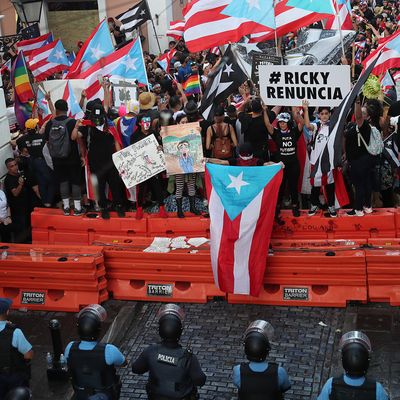
Monday marked ten straight days of protests in the streets of San Juan, Puerto Rico, as a crowd numbering in the tens of thousands called for the resignation of Governor Ricardo Rosselló, who is embroiled in competing scandals over bigoted text messages and a corruption probe that ended in the arrest of two top administration officials. Fed from feelings of exploitation in the wake of Hurricane Maria and the debt crisis that has loomed over the island for five years, the protests shut down a highway as demonstrators marched toward the governor’s residence, shouting “Ricky, renuncia, el pueblo te repudia,” which translates to “Ricky, resign, the people reject you.” Below, a primer on the territory’s political crisis as it paces toward its second week.
The Protests
Puerto Rico’s largest daily newspaper, El Nuevo Día, cited an analysis by a geographer who estimated that 500,000 people attended the demonstration on Monday, dwarfing the nine days of protest leading up to the march that paralyzed the capital.
Protests weren’t limited to the island:
Why Are Puerto Ricans Protesting?
The spark for the turmoil ignited last week, when leaked text messages sent by Rosselló were released by Puerto Rico’s Center for Investigative Journalism. Sent over the messaging app Telegram, the texts show Rosselló making an array of of racist, homophobic, and insensitive comments.
“Among the insults Rosselló hurls in the chats: He calls a Puerto Rican-born New York official a “whore” and says she should be beaten; says an oversight board managing the island’s financial crisis can “go f*** yourself”; and tells one of this then-top officials that he’d be doing him a “grand favor” by shooting San Juan Mayor Carmen Yulín Cruz.”
The entirety of Rosselló’s chat conversations were made public on July 13, three days after the Justice Department accused former Education secretary Julia Keleher and former director of the Puerto Rico Health Insurance Administration Ángela Ávila Marrero of illegally steering over $15 million in federal contracts to preferred consultants. Rosselló was on vacation in France when the officials were arrested.
The scandals have aggravated a half-decade of crisis on the island. Already struggling with high unemployment and back-breaking debt, the island was devastated in 2017 by Hurricane Maria, which killed thousands and left Puerto Ricans waiting for power to return for up to 11 months. In the aftermath of the storm, the island’s population has continued to dwindle as more and more people leave for the mainland. Rosselló’s management of the hurricane’s aftermath — particularly his decision to sign over $300 million to a little-known Montana company to supervise cleanup — was widely criticized.
Meanwhile, a longstanding sense of grievance among Puerto Rico residents over the island’s neo-colonial economic mismanagement has continued to fester. In 2014, bonds issued by Puerto Rico were reduced to junk status after credit agencies deemed the government unable to pay off its debt. To avoid having San Juan pay its debt with savings, Congress appointed an oversight board to balance the budget. But the board, known as la junta de control on the island, is deplored for exceeding its oversight responsibilities. As New York’s Andrew Rice wrote in a report on the debt crisis: Critics “decry both the impact of the cuts and the fact that much of the resulting savings would go to repay creditors, including the hedge funds, many of which bought bonds at a deep discount after Puerto Rico defaulted on its debts.”
How Has Rosselló Reacted?
Responding to calls for his resignation, on Sunday Rosselló said that he will not seek reelection in 2020 and announced that he would step down as president of Puerto Rico’s New Progressive Party.
Gerardo Portela, the principal investment officer of Puerto Rico’s economic development bank, quit in protest hours after Rosselló made his announcement: “Unfortunately the events in recent weeks, including the attitudes reflected in the comments of officials and advisers of the current administration, do not match my values,” he wrote in his resignation.
What Have Reactions Been on the Mainland?
Several lawmakers, including some Democratic presidential candidates, have voiced their support for the protests. Julián Castro, who has made Puerto Rico a focus of his campaign, was the first Democratic candidate to call on Rosselló to resign. Others to have done so include Elizabeth Warren, Pete Buttigieg, Cory Booker, Bill de Blasio, and Tim Ryan. Tulsi Gabbard joined the protests herself on Friday.
President Trump, who engaged in an ugly feud with San Juan’s mayor in the aftermath of the storm, has long attacked Puerto Rican leadership as undeserving of more federal aid. In June, he signed into law a bill that would provide the island with billions of dollars in disaster relief, but on Thursday, Trump jabbed again at Puerto Rican leadership on Twitter, claiming that island executives are “robbing the U.S. Government blind!” On Monday, he added a nuanced assessment of the crisis:
What Happens Next?
Amid the historic protests on Monday, Governor Rosselló appeared on Fox News for his first interview since the demonstrations began, citing his “process of introspection … I made a decision, I’m not going to run, I’m not going to seek reelection. That way I can focus on the work at hand.”
During the interview, when asked if he could name an official on the island who still supported him, Rosselló cited Javier Jiménez, the mayor of San Sebastián. But Jiménez soon spoke to the city’s paper, El Nuevo Día, claiming otherwise. If Rosselló does succumb to the deafening calls for his resignation on the street, from the mainland, and within his party, Puerto Rico’s Justice secretary, Wanda Vázquez, would become governor.





























